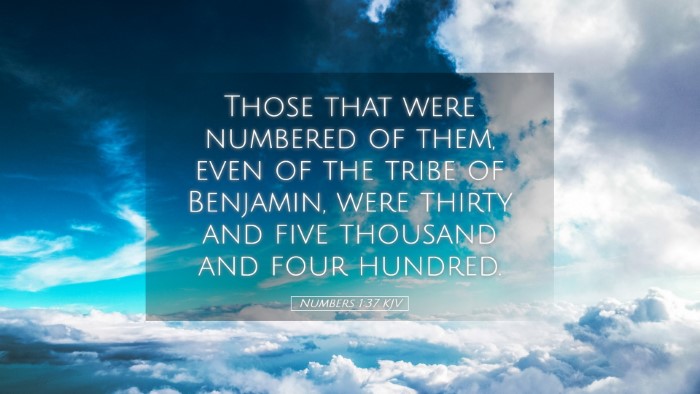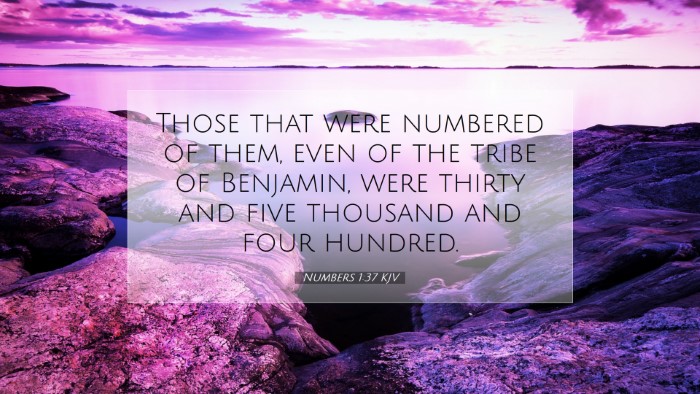Bible Commentary on Numbers 1:37
Verse: Numbers 1:37 - "Those that were numbered of them, even of the tribe of Manasseh, were thirty-two thousand and two hundred."
Introduction
In this verse, we find the results of the census conducted in the wilderness of Sinai, under God's command through Moses. The census was a pivotal moment that defined the organization and structure of Israelite society, highlighting the importance of each tribe, their numbers, and their roles in the community.
Historical and Theological Context
Understanding the significance of this passage requires a closer examination of the context in which it was situated. The Israelites had been liberated from slavery in Egypt, were on the brink of entering the Promised Land, and faced the challenges of establishing a new covenantal identity. This census serves multiple purposes:
- Organizational: To organize the tribes for military and logistical purposes.
- Theological: To reaffirm God's promises regarding the growth and inheritance of His people.
- Sociological: To ensure that the responsibilities of each tribe were clear.
Insights from Commentaries
Matthew Henry's Commentary
Matthew Henry emphasizes that the numbering of the tribes was not merely a matter of administration but also a reflection of God's faithfulness to His covenant people. He notes that the tribe of Manasseh's specific number—thirty-two thousand and two hundred—illustrates the growth and blessings of God upon them since they settled in the wilderness. Henry also points out that this number might encourage other tribes as they see God’s provision manifesting effectively.
Albert Barnes' Notes on the Bible
Albert Barnes brings attention to the fact that the tribe of Manasseh is significant due to its dual inheritance and the separation of its portion east of the Jordan and west in Canaan. He argues that the context of the census is meant to aid in military preparations, reinforcing that every tribe had to stand ready to defend their land and heritage as they faced conquest. Furthermore, Barnes elaborates on the traits of this particular tribe, indicating their strength and contributions to the nation, thus presenting them as a crucial player in what was to come.
Adam Clarke's Commentary
Adam Clarke provides a detailed analysis of the numbers belonging to the tribe of Manasseh in this verse, emphasizing the importance of understanding these figures in the broader narrative of Israel. Clarke highlights that the demographic data here is supernatural—it comes from a divine command to Moses, therefore underscoring God’s sovereign control over Israel’s history and future. He posits that each tribe symbolically represents various attributes of God's nation and faithfulness.
Spiritual Implications
The details in this verse remind pastors, scholars, and theologians of the following spiritual insights:
- God's Sovereignty: The verse reaffirms that God is in control of His people’s destinies, as each number corresponds to divine intention.
- The Importance of Community: The tribal system highlights that every individual has a place and purpose within the community of faith.
- Faithfulness: Just as God fulfilled His promise of growth to the Israelites, He is faithful to His promises to the Church today.
Application for Modern Believers
In reflecting on Numbers 1:37, the implications are profound for modern believers who strive for community, purpose, and identity in Christ. The careful accounting of the Israelites invites the church to consider:
- How do we recognize the contributions and roles of individuals in our congregations?
- Are we mindful of how God has called each member of our communities to serve Him?
- How can we foster an understanding that each believer is a vital part of the body of Christ?
Conclusion
Numbers 1:37 encapsulates a crucial moment in Israel's history, rich with implications for community, leadership, and divine faithfulness. The insights drawn from the commentaries of Matthew Henry, Albert Barnes, and Adam Clarke serve to deepen our understanding, leading to transformative applications in our communities of faith today. Recognizing God’s work in our lives, just as He did in the lives of the Israelites, is essential for our spiritual growth and communal health.


